
Primary Curriculum Guide
Nurturing wonder, joy, and individual growth through ages 1 to 11
2024-2025
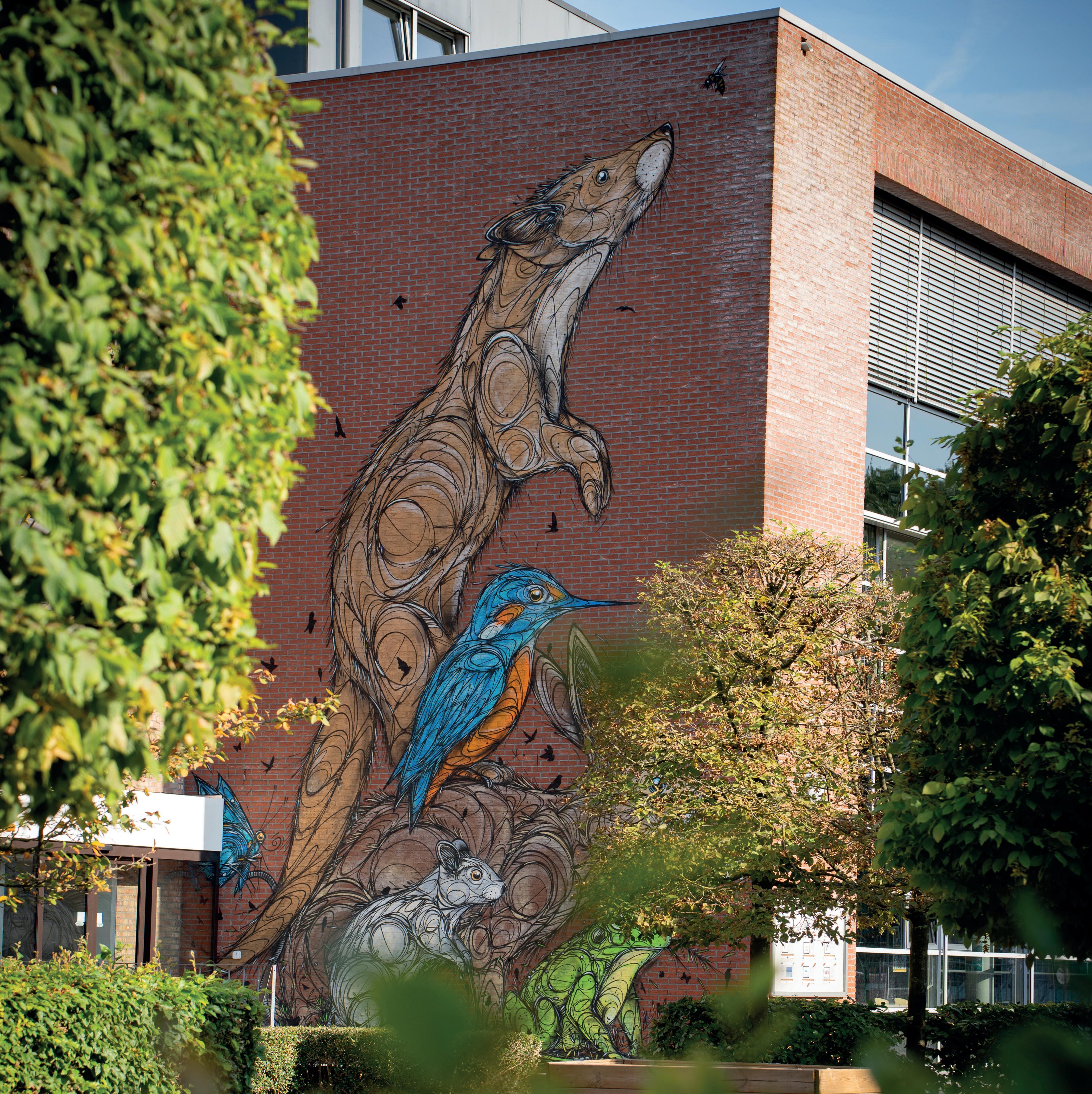


Nurturing wonder, joy, and individual growth through ages 1 to 11
2024-2025

The Primary School caters for children from the ages of 1-11 and we see it as a great privilege to support your child through this exciting and rapid period of change and development.
Our curriculum is designed to be research informed to ensure that all our work is done with the age-related emotional, social and cognitive needs of your child in mind. To this end our curriculum changes and grows with your child to ensure that at each stage of their primary education, they are placed right at the heart of all we do.
We are unapologetic in our belief that learning should be full of wonder and joy. That’s not to say that it is always easy, but there can be joy in overcoming an obstacle and wonder in challenges.
Our staff think carefully about how their lessons and your child’s experiences can be positive and to this end, we utilise visitors, trips, outdoor learning, stories and all kinds of learning tools to foster curiosity and engagement.
We aim to help children find their voice – to be empowered to find their unique, personal significance and from this foundation of confidence to be able to make a contribution to the world. It is important to us that our students become responsible and engaged members of their communities – whether that be their family community, their school community, the local and national community and/or the global community.
BSB is an international learning community for children aged 1-18 years and is independently ranked as one of the best schools in the world.
We recognise that all children are unique – some may need more help in some areas of learning or social development than others and we are committed to ensuring that your child gets the personal attention they need.
We have wonderful support staff on hand to help with language learning, with additional learning needs and with social and emotional support. Our teaching staff are committed to knowing your child well and developing learning tasks that are well suited to their personal needs and stages.
BSB is an inclusive international community, working together to inspire success.
Our aim is to be an educational force for good in the world by:
• developing confident, caring and courageous people who engage actively, ethically and purposefully with the world around us.
• fostering curious, resilient learners who enjoy life and achieve the best that they can be.
• encouraging respect for self, others and the wider world.
In order to ensure that every child has an entitlement to opportunities that help them move towards these guiding statements, our curriculum has undergone extensive review to ensure that children at BSB want to learn and can see and feel the impact of their learning on the world around them. By building creativity and agency alongside knowledge and skills, we are creating the connected and engaging curriculum that our children deserve.
By building creativity and agency alongside knowledge and skills, we are creating the connected and engaging curriculum that our children deserve.
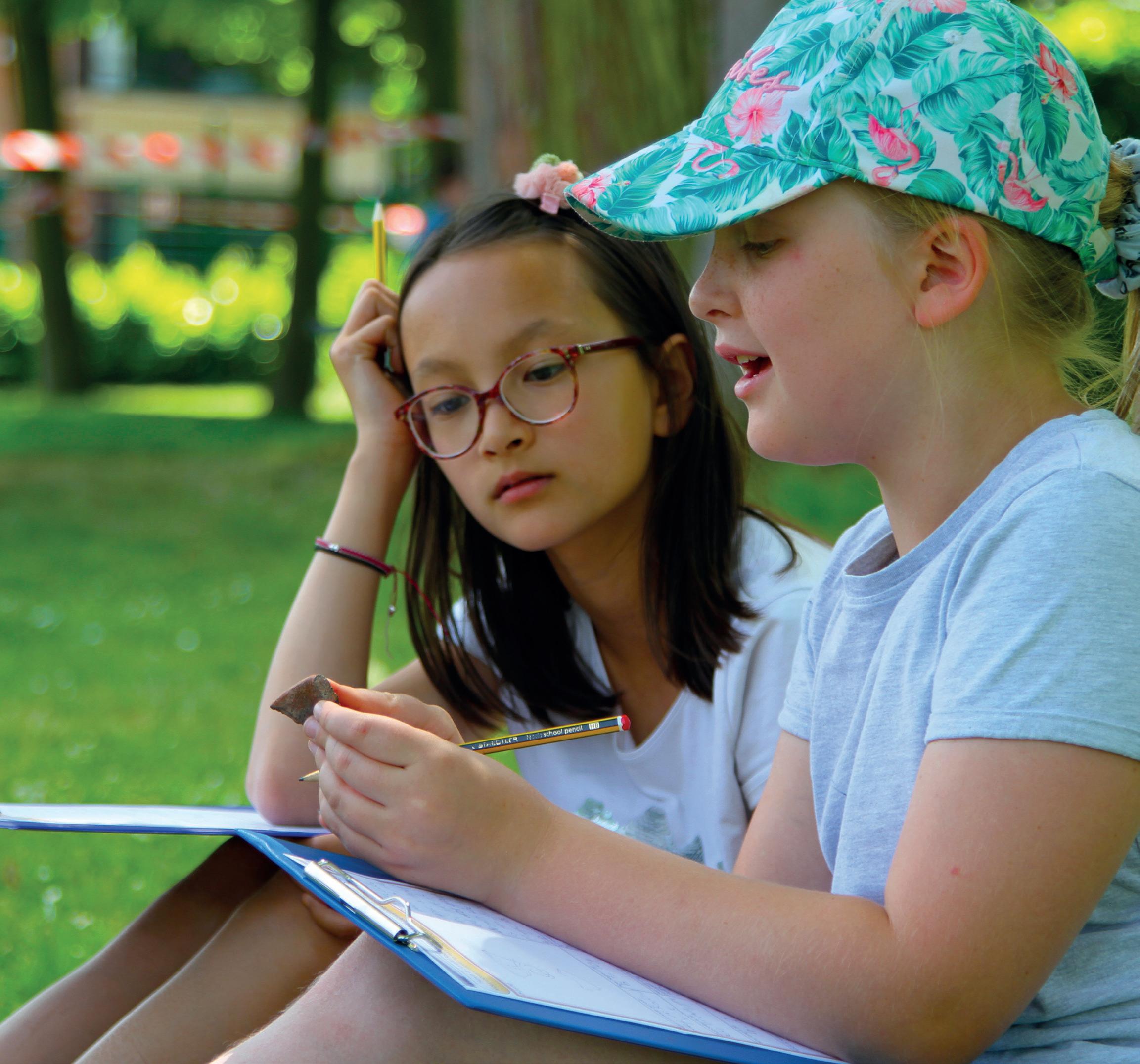
As a British School, we are guided by the National Curriculum for England while being aware that each UK nation has a unique curriculum and we have referred to all of those nation’s models as well as a range of international curriculum models to create our own – one that feels uniquely linked to our values, that connects our young people to Belgium, its language and heritage and looks out across the world.
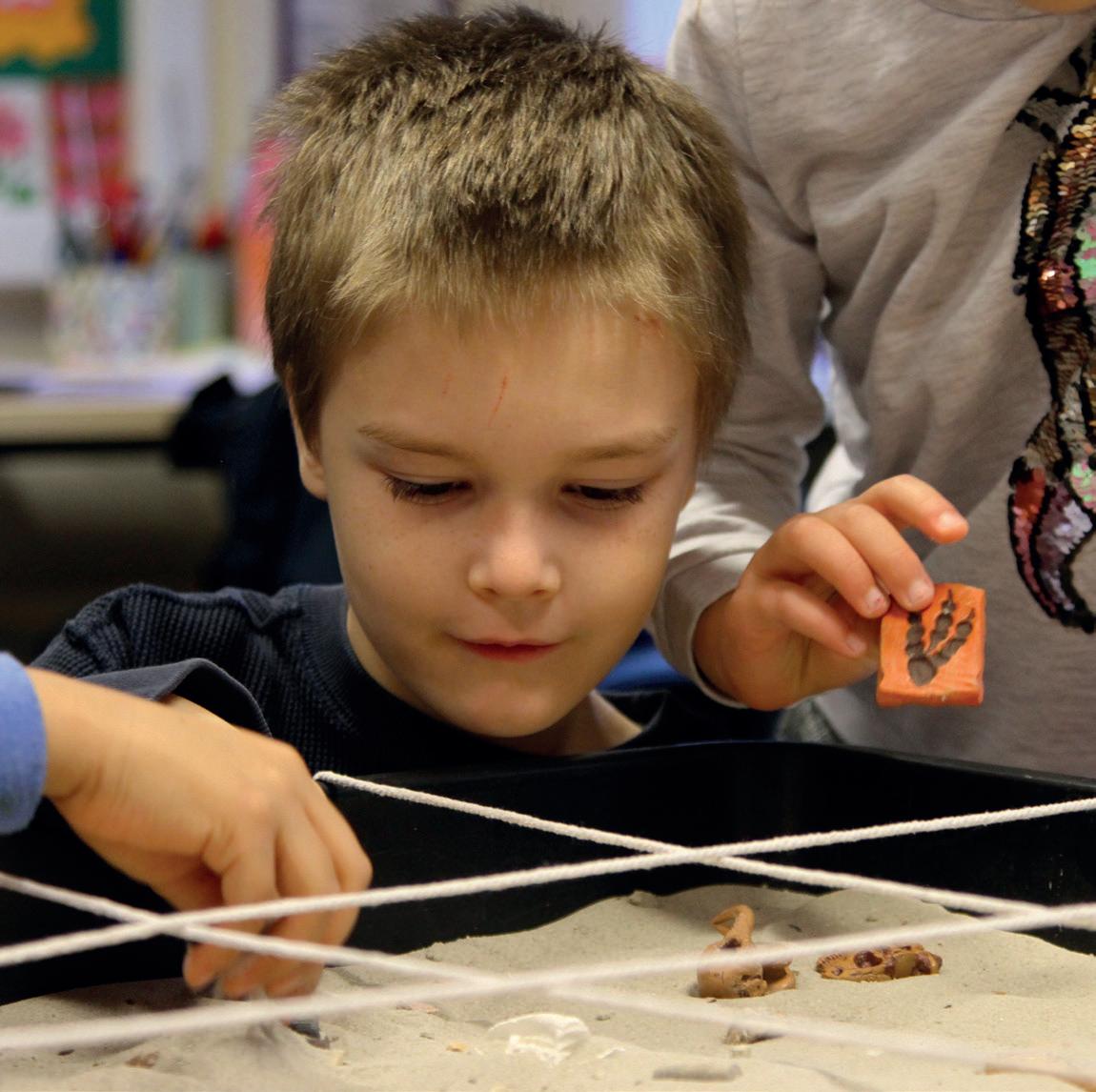
BSB is committed to providing a credible, coherent, holistic curriculum built around the guiding statements above and underpinned by the UNESCO 4 pillars:
• Learning to know.
• Learning to do.
• Learning to live together.
• Learning to become.
At BSB this means our curriculum has an emphasis on:
• learning together by valuing contribution, connectivity and diversity.
• student agency to make a positive difference to the world.
• becoming the best person we can be.
• providing opportunities for inquiry, critical thinking, creativity and learning beyond the classroom.
• scholarly endeavour and challenge.
• provision of a variety of pathways to set students up for success.
Staff across the whole school have worked together to develop a set of learning and teaching principles for BSB and these, along with the specific developmental needs of different ages of children are what we intend for your child to experience in class:
• We provoke wonder and joy in learning.
• We build and nurture strong relationships and know our learners well.
• We are experts in our field, engaging learners to discover more to make a difference.
• We create inspiring and supportive environments that promote creativity and enable ownership of learning.
• We develop knowledge and skills for life and learning.
We recognise that outstanding free flow exploration leads to deep levels of involvement which leads to outstanding progress.
Our curriculum is built around the best evidence from international research into early childhood development and aims to create an enabling environment, thereby children learn independently with the support of expert adult interactions.
Our enabling environment and our highly trained early years practitioners use materials, space, questioning, stories and provocations to explore all the aspects of early learning with children and so while we have guiding questions and regular books to stimulate learning, these are simply guides and the children may take us off in many directions as we go.
Our environment is:
• accessible to all.
• organised and clearly labelled.
• designed to be flexible and so that things can be used in multiple ways to encourage imagination and creativity.
• reflective of the needs and interests of all learners.
• designed to encourage high quality experiences and interactions.
• safe and secure.
Along with the rest of the Primary School, our KG and Reception children follow an inquiry-led set of Units of Discovery. These are explorative and playful and intended to encourage a growing curiosity and understanding of the world around them. The Units of Discovery questions can be seen in the tables below in the Primary curriculum section.
Within each of these questions the children are free to take us in different directions, following their interests and discoveries with expert adult guidance. Our focus is on wellbeing through engagement and the staff closely observe and support your child to ensure they develop across all the areas of the Early Years’ curriculum:
• Communication and language
• Physical development
• Personal, social, and emotional development
• Literacy development
• Mathematics
• Understanding the world
• Expressive arts and design
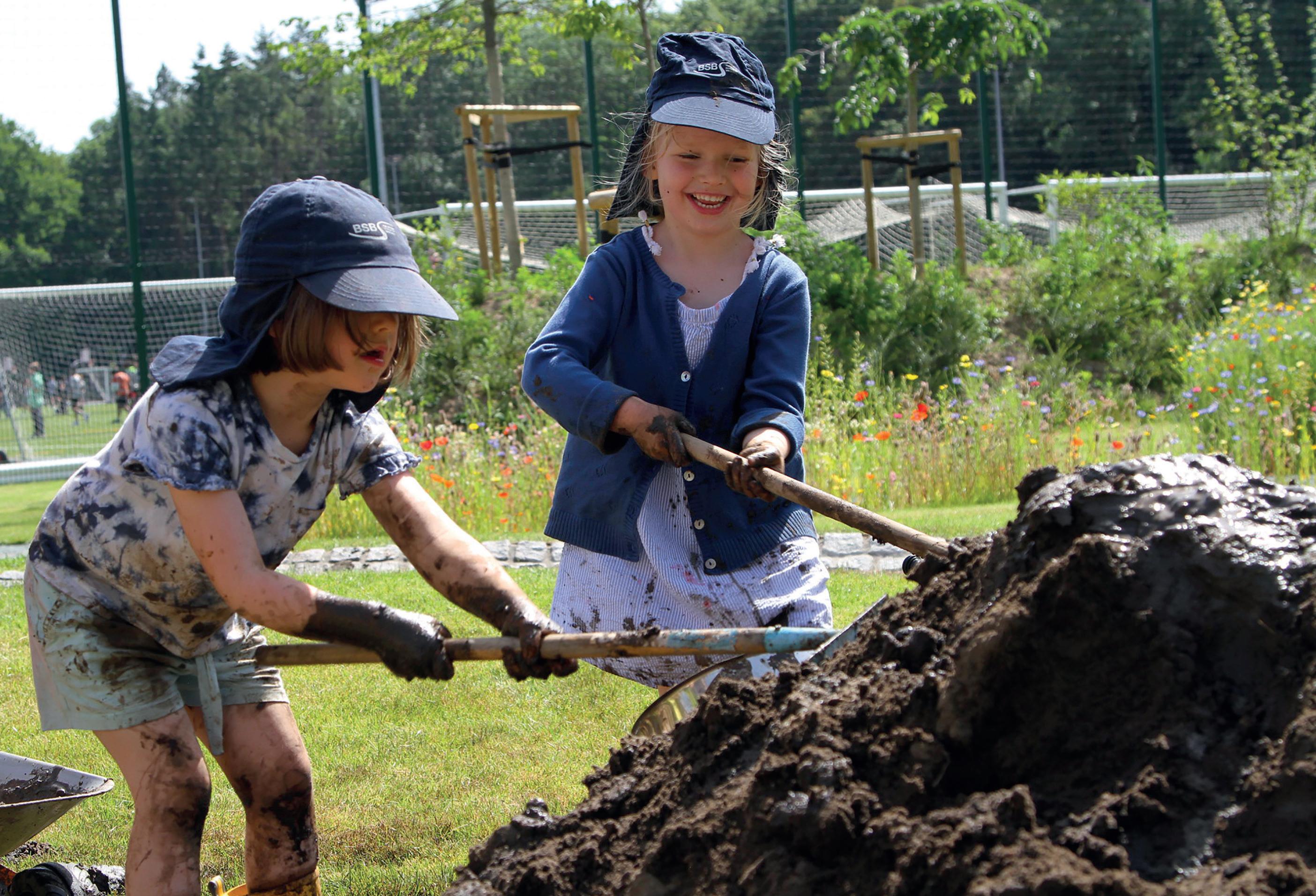
Learning outside
Outdoor learning is an essential part of our Early Years provision and you can expect that your child will spend a great deal of time outside, exploring the world around them and getting messy and immersed in investigating possibilities.
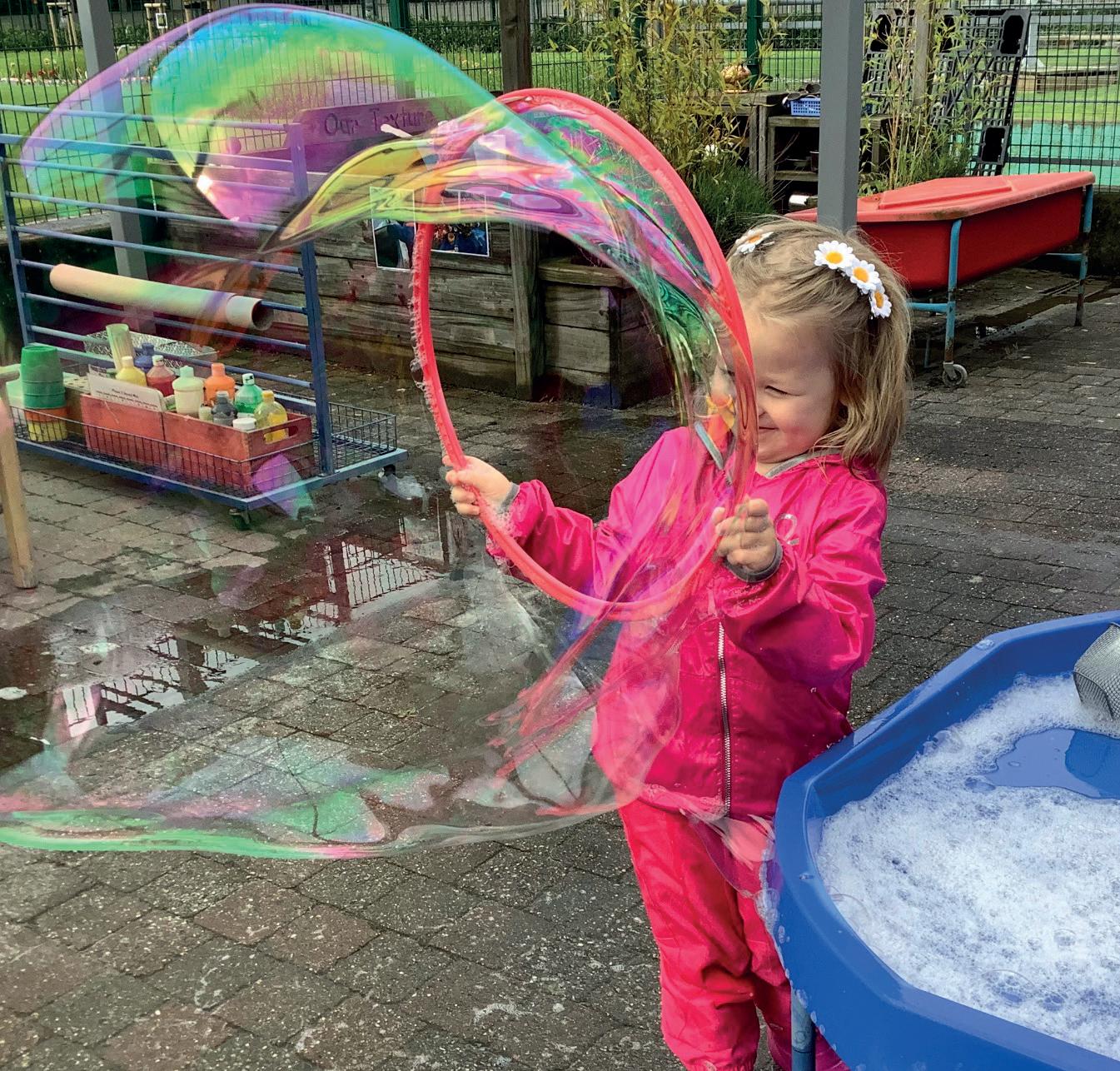

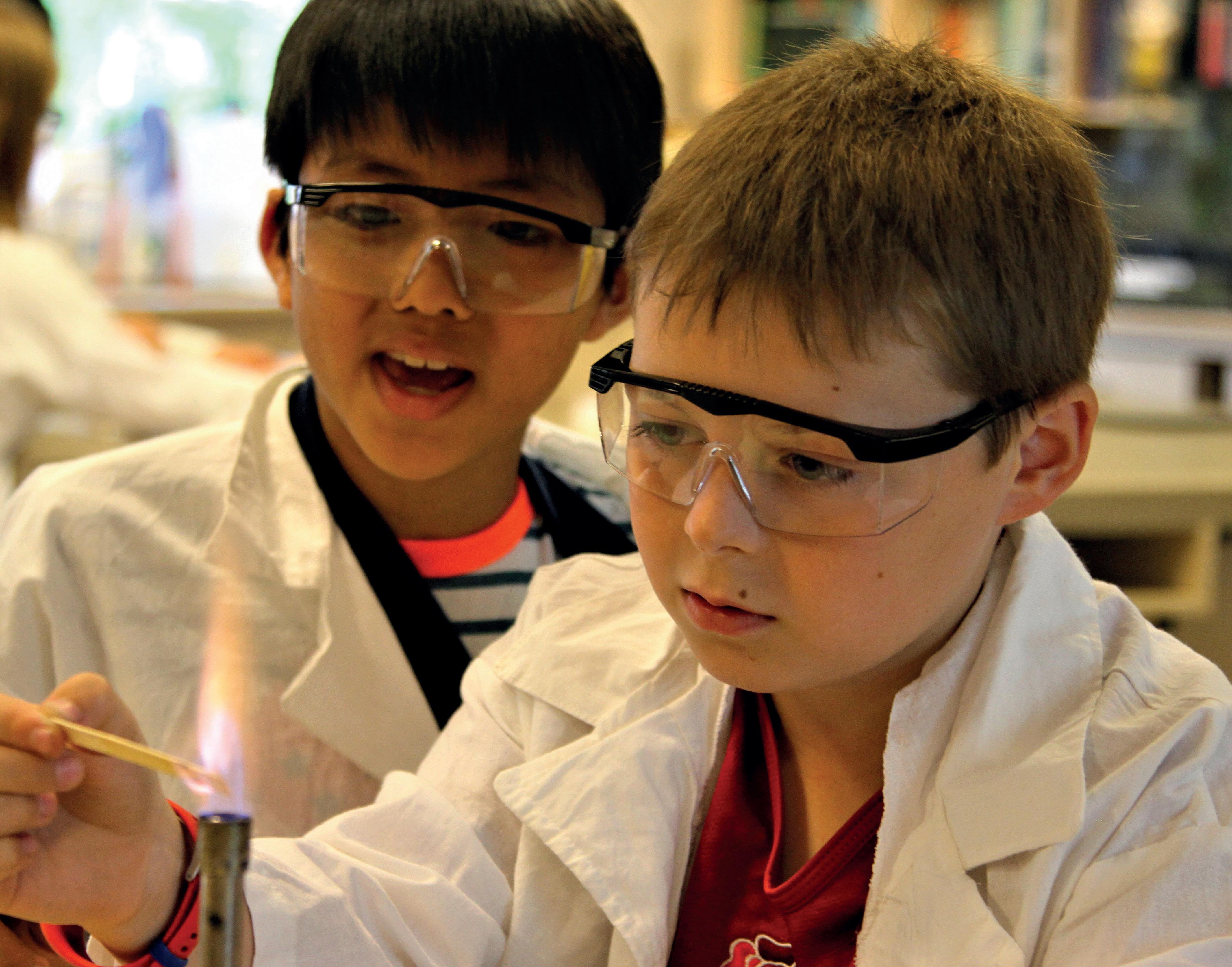
Each year group from Y1 to Y6 has a bilingual class taught by both English and French specialists. In general, English lessons are taught by the English specialist and Units of Discovery and French lessons taught by the French specialist. Children in the bilingual classes, like other classes, also receive specialist lessons.
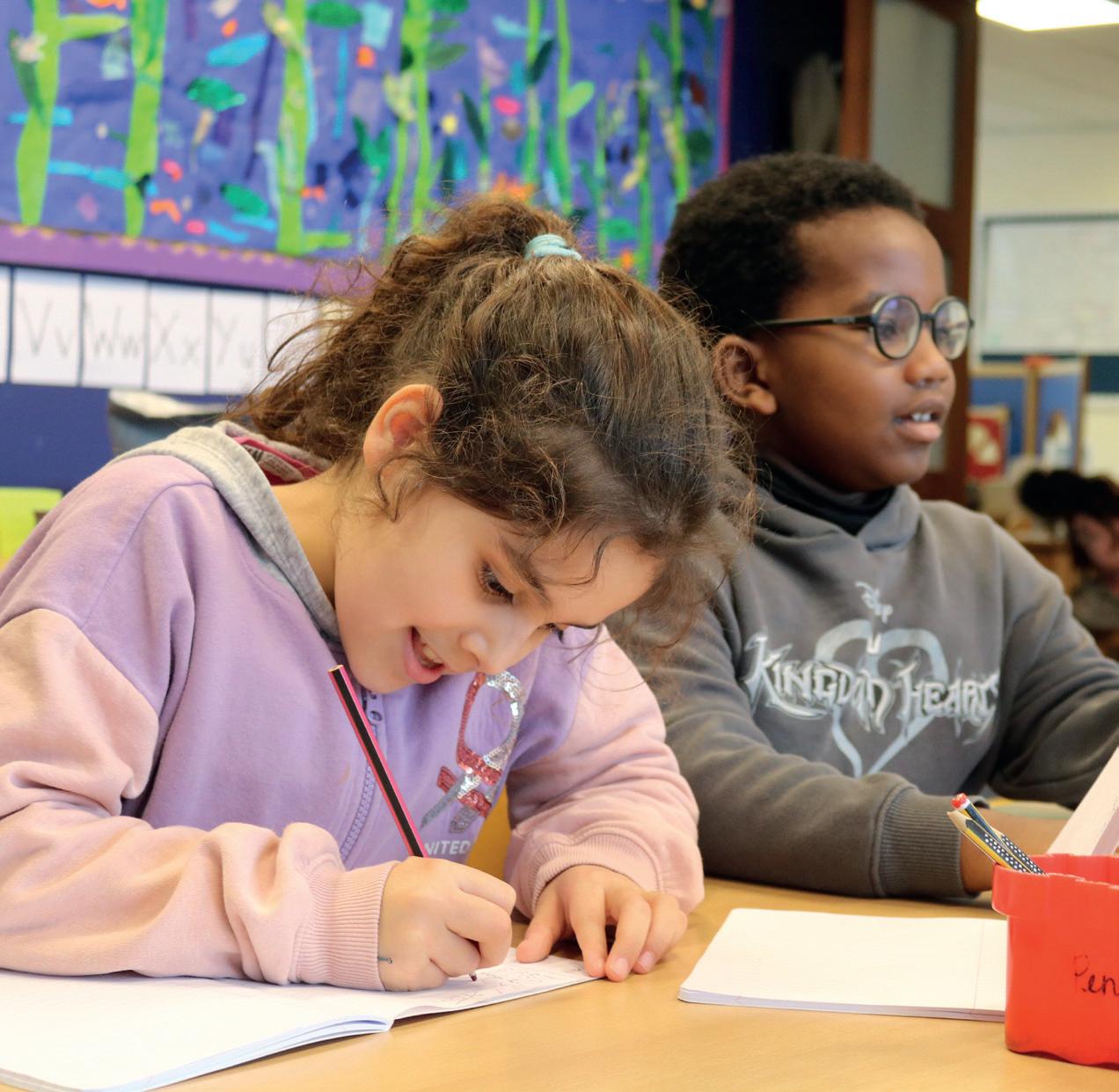
In Lower Primary we believe that our practice should build from the excellent foundations of Early Years and, in keeping with many jurisdictions around the world (for example, Scandinavia, Singapore, Wales), we see Lower Primary as an extension of the Foundation Stage.
We try to balance this play-based approach with the demands of the English National Curriculum so that children are prepared for the transition to Upper Primary without losing access to the provision that is tailored to their age and developmental needs.
In Upper Primary we build on the good practice established in Lower Primary while also recognising the increasing demands that secondary education will place on our children. These are bridging years as we adjust our teaching and learning as the children develop physically, cognitively, emotionally and socially. Nevertheless, we hold onto the principle that play, joy and wonder are essential entitlements for children as is their right to be curious and creative and as such, we maintain opportunities for play, for trips and visitors to the school and enhanced provision of learning.
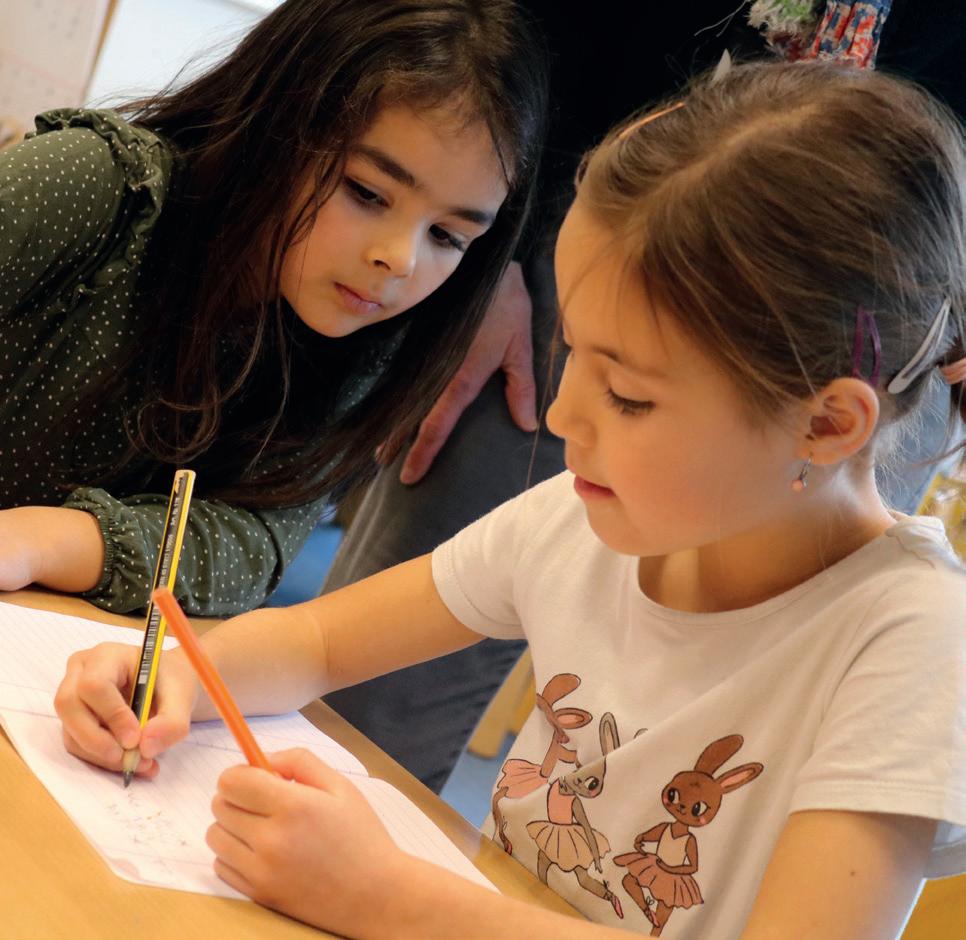
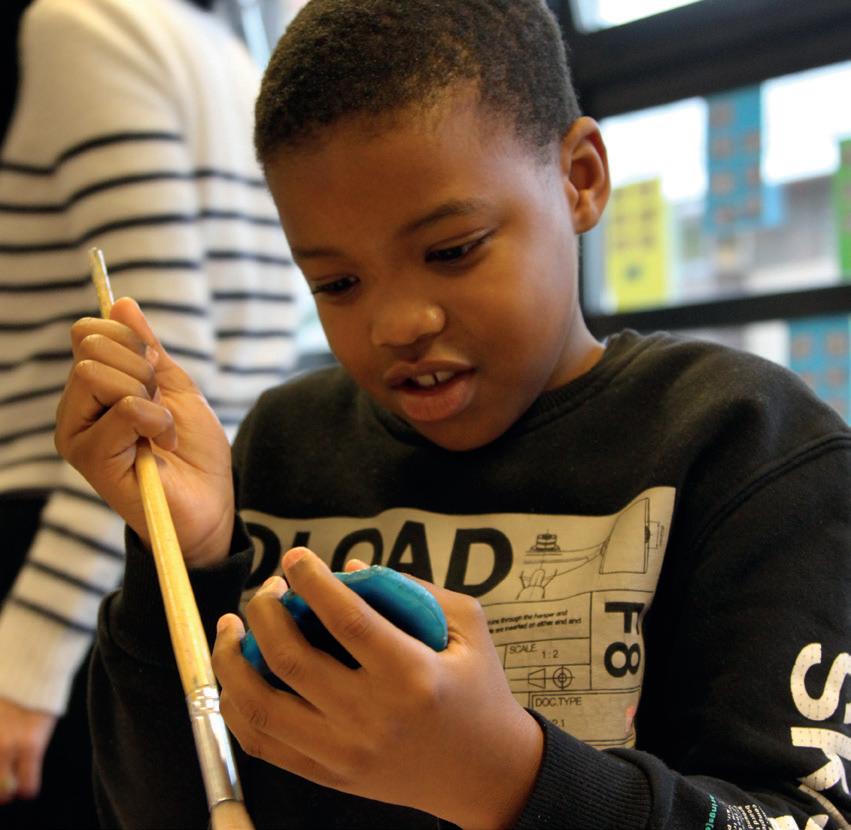
In 2019 the school began a process of reviewing the curriculum for students in years 5-8 to ensure that we could capitalise on our ‘one-schoolness’ and ensure smoother and more interesting transitions for students moving from Primary to Secondary school. This has led to Secondary subject leads working with Primary curriculum leaders to ensure that students are fully ready for Secondary specialisms and it has led to more collaboration between students and staff across the school.
The work is ongoing, but at its heart sit principles of having strong transitions that make our students feel safe and competent; more cross curricular working to see how subjects connect in the real world; developing creative and critical thinking skills in young people; strengthening a sense of agency in learning and empowerment of young people by developing strong service elements and community links, and building on our outdoor provision.
Both Lower and Upper primary follow the White Rose Maths scheme which is a mastery model designed to sequence mathematical concepts and understanding.
In Lower Primary, this sequenced provision is enhanced by interactive, playful investigation, built on the work of Dr Helen Williams (author of Playful Mathematics). We feel that this approach allows children to embed the key concepts they are learning through White Rose and to ensure that their enjoyment of Maths continues.
Alongside White Rose, our Maths curriculum leaders have introduced enrichment activities to deepen and develop children’s understanding of mathematical concepts and these are intended to foster curiosity and exploration. Maths is taught to whole class without streaming or setting until Year 5. At this point, children are grouped according to their preferred pace of learning.
All groups in Years 5 and 6 will follow the same curriculum and look at the same concepts, but some might do so more quickly and go into more complex depth than others who may need some consolidation. This approach differs from traditional setting/streaming because no child shoots ahead to new content, creating a larger knowledge gap. Our groupings remain fluid for the first half of the year until we are confident that your child is in the group that best suits their pace of learning.
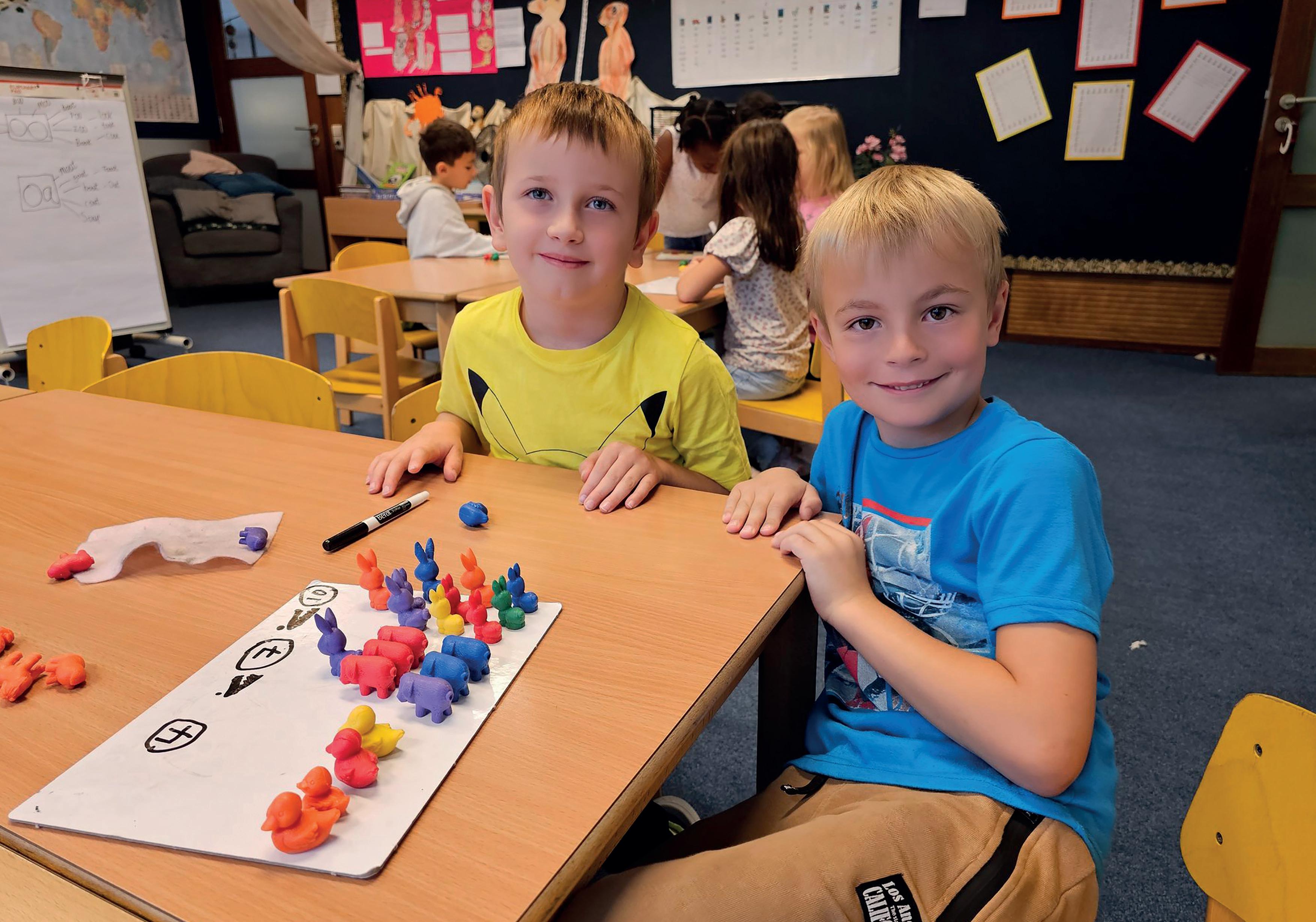
You can find more detailed information about White Rose Maths on their website.
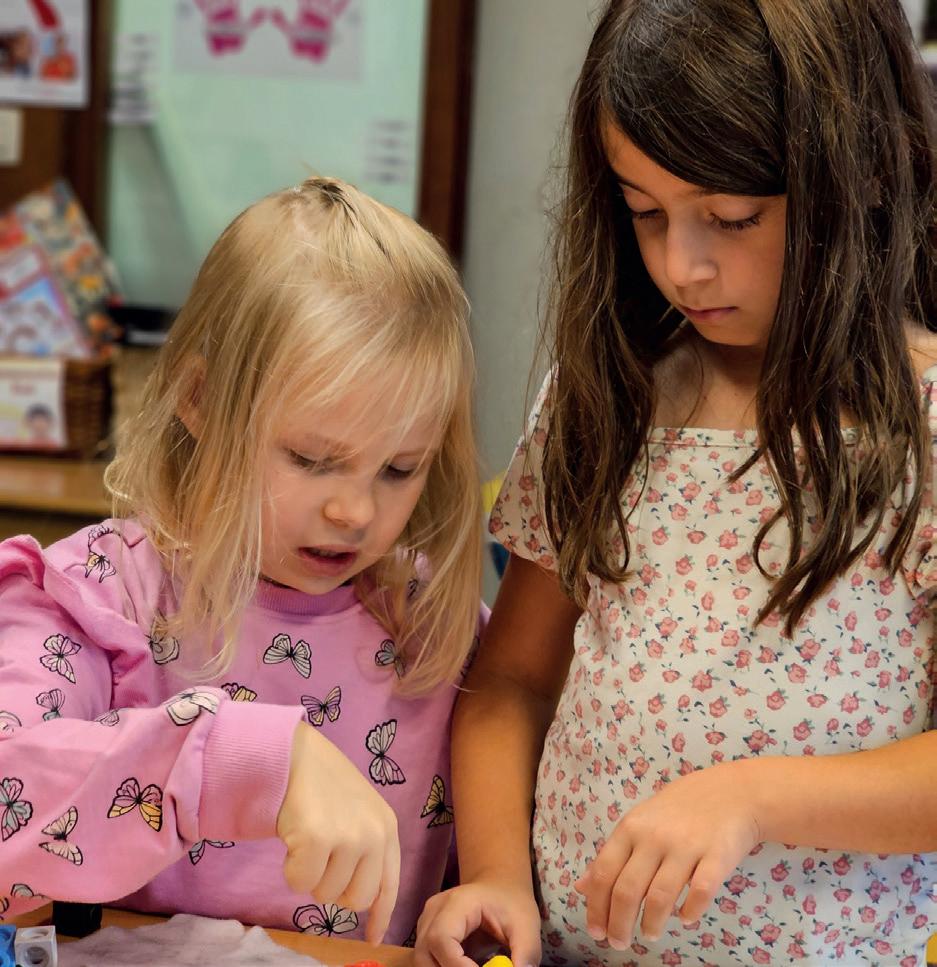
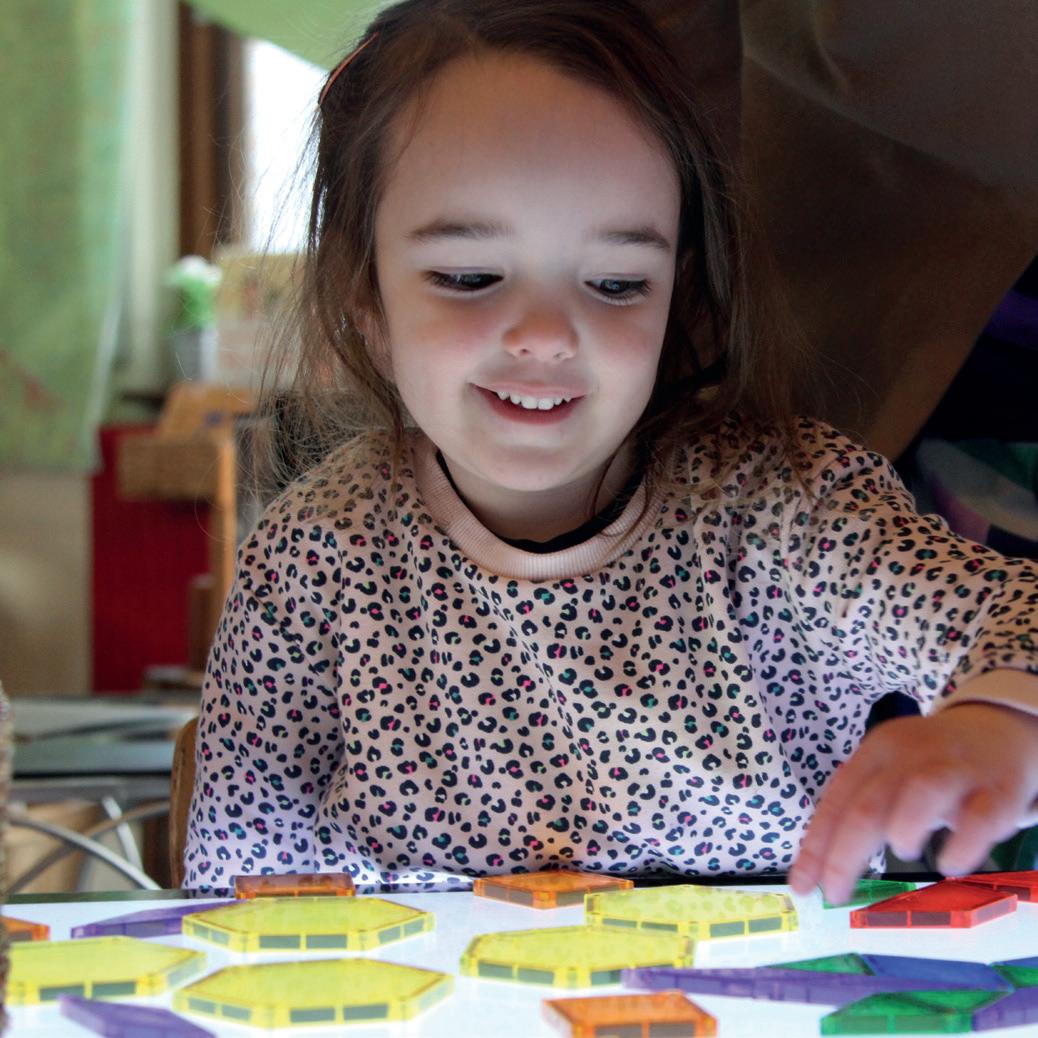
English at BSB goes beyond English itself in order to celebrate the beauty and diversity of language in all its forms. Because our students are diverse and unique, so is our curriculum.
We aim to engender a lifelong love of reading in our children, but also a lifelong appreciation of the craft of communication – the ability to find the words to express our intentions in order to show respect for others and to articulate our points of view. English at BSB aims to show children that the world is a complex place, full of different and sometimes conflicting experiences and opinions, but that with the power of language, we can seek to understand and shape our world, both for ourselves and for others.
We recognise that our students may be transient and that they come from a wide range of cultures and may go on to experience more. As such we seek to send them out into the world after their time with us, with confidence, as coherent communicators and with the knowledge that wherever they are and whatever challenges they face, there is always a world to escape to within the pages of a good book!
To this end, our English curriculum at BSB is built around a love of books – we take a whole book approach to reading in which vocabulary, comprehension, talk, grammar, spelling and wider areas of learning are explored within the pages of a book. This approach is firmly rooted in research.
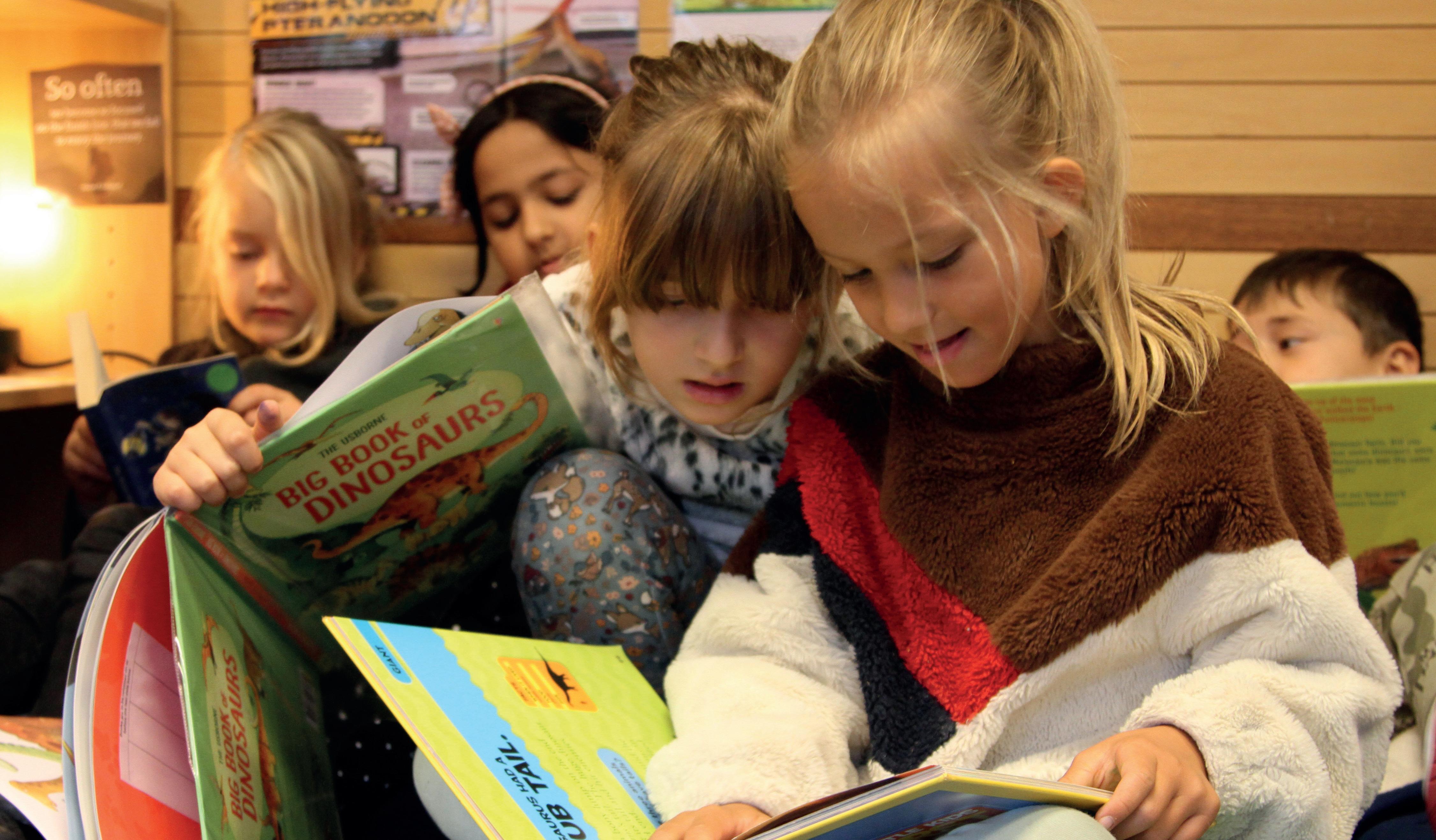
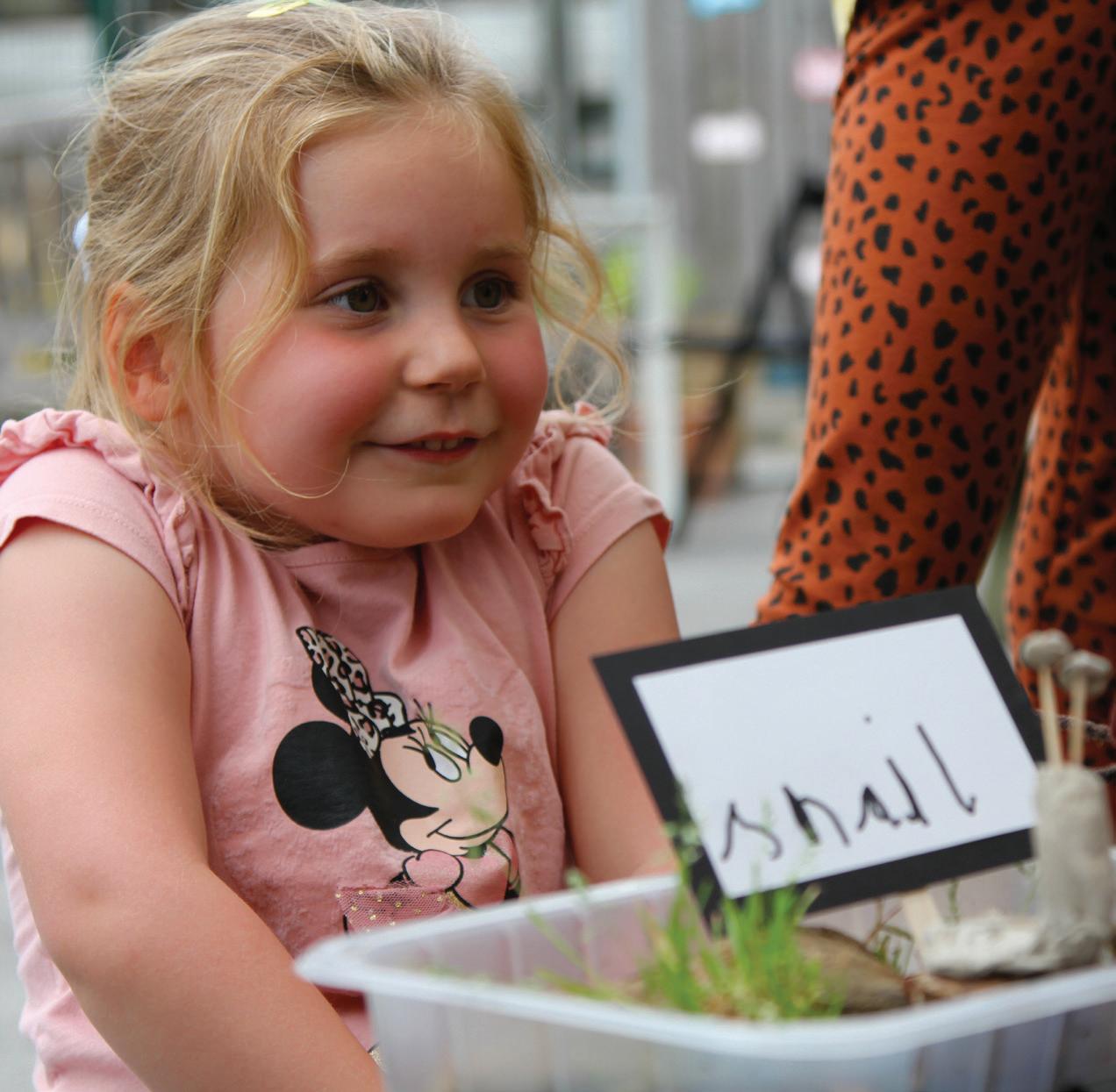
Our English curriculum at BSB is built around a love of books. We take a whole book approach to reading in which vocabulary, comprehension, talk, grammar, spelling and wider areas of learning are explored within the pages of a book.
In addition, in Lower Primary, as children begin to read and develop an understanding of the relationship between sounds and letters (phonemes and graphemes), they will follow a phonics scheme – Letters and Sounds.
Research shows that well-sequenced phonics learning is essential to the development of early reading alongside immersion in books that children love. Our phonics teaching is supported by a reading for pleasure programme that aims to encourage children to read as much as possible and to love books. It is also supported by plenty of continuous provision that encourages children to write freely as they learn and play.
Some classes throughout the Primary school may use additional resources from time to time to meet the needs of the children in their class – an example of
this might be a programme like Babcock to support children in their recognition of spelling patterns, but for the most part, spelling, like grammar, will be taught as they encounter those elements in the books they read in English classes and are woven into the scheme of learning.
As far as possible, books in English are linked to the Units of Discovery to deepen the children’s understanding and to make connections. In addition, all children have a library lesson with our teacher librarian to explore books and themes from Units of Discovery in more detail.
Units of Discovery aim, as the title suggests, to create a sense of wonder for the children while developing their independent research and inquiry skills.
They cover the subject content, at different times of the year, of Science, Art, History, Design Technology and Geography with elements of Computing, PHSE and English supporting the learning.
Each Unit of Discovery has an overarching question of inquiry that forms the basis for the children’s learning. While subjects may be blended (where appropriate), teachers are careful to ensure that the specific domains of those subjects are taught and understood by the children. For example when working scientifically, children will consider terms such as hypotheses, fair
tests, variables and other subject specific terms and language. Similarly in History, students will follow the second order concepts that underpin historical thinking, such as change and continuity, significance, similarities and differences, cause and consequence and use these to form the basis of historical inquiry.
The Units of Discovery follow and cover all the elements of the English National Curriculum (NC) for Science, History, Geography, Design Technology and Art and curriculum leaders have carefully mapped out the content that each unit should cover in line with
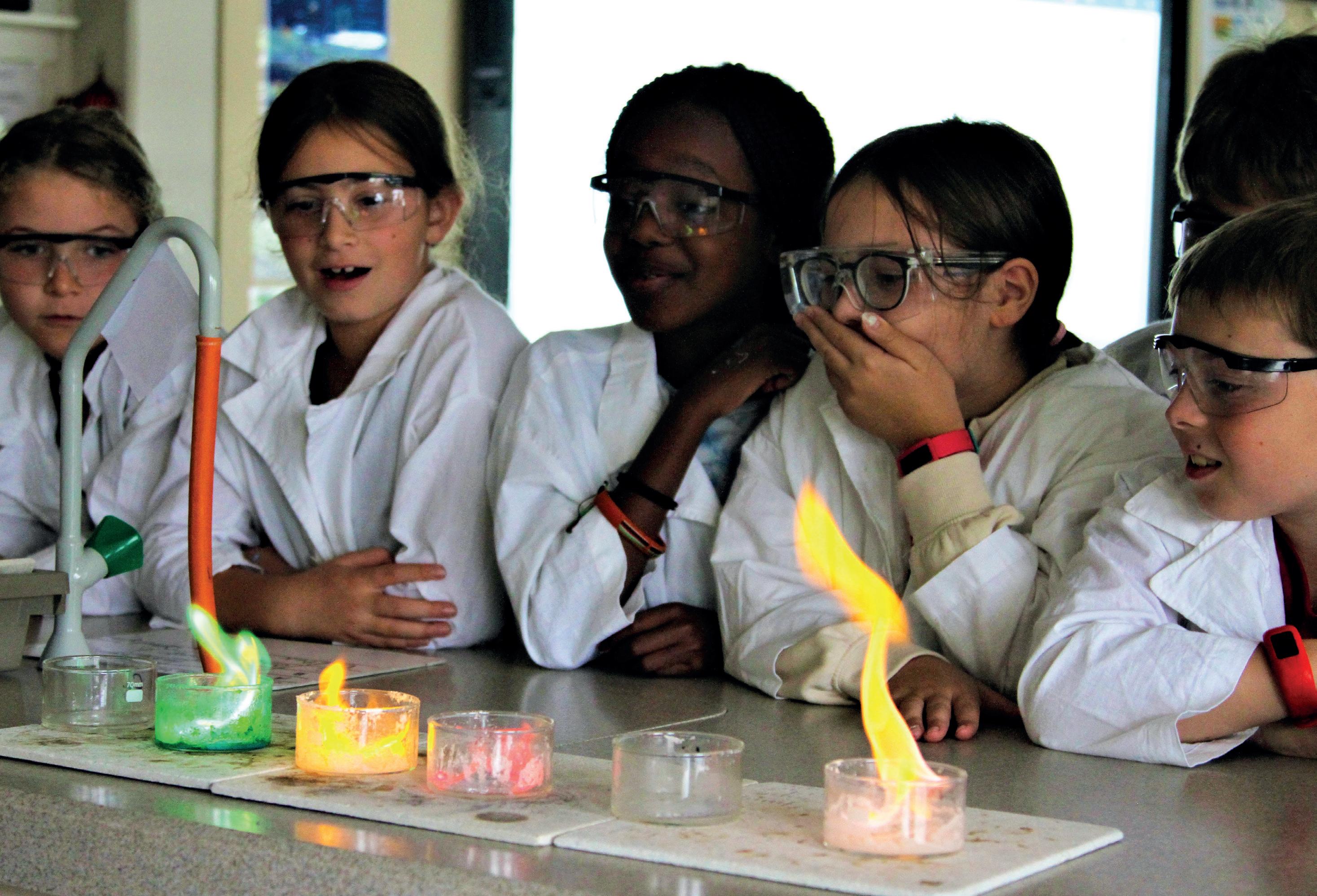

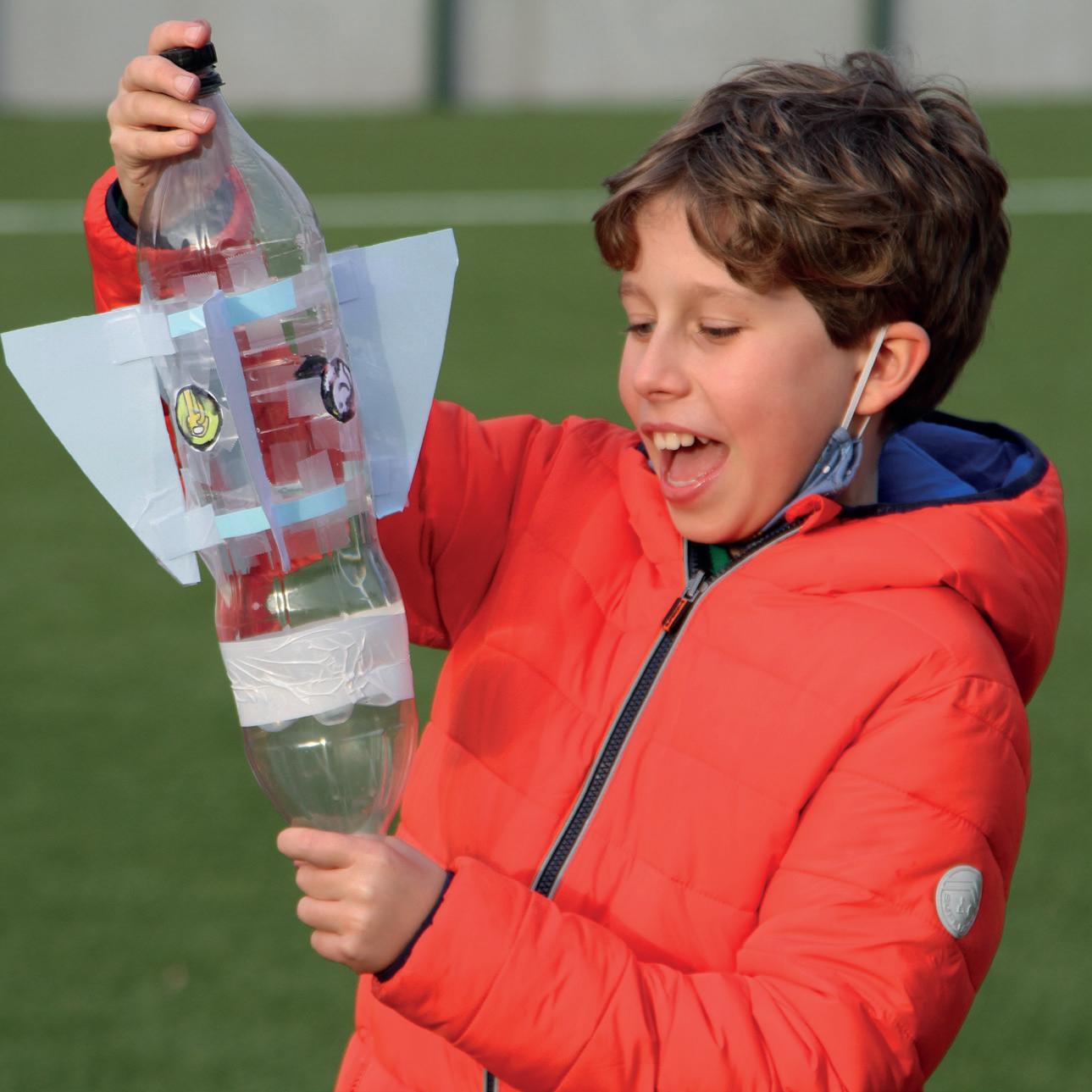
The Units of Discovery follow and cover all the elements of the English National Curriculum (NC) for Science, History, Geography, Design Technology and Art.
NC expectations. There are also elements of PHSE (Personal, Health, Social and Economic) education built into the Units of Discovery.
At BSB, however, we look beyond a national curriculum. Our Units of Discovery ask children to ask questions about the state of the world – past, present and future – and to place themselves as empowered, active citizens within that world. As such, many of their units lead to change and action. In investigating their questions, children consider deeper philosophical and ethical issues around responsibility, power, sustainability and community. They explore how the subjects they study have contributed to and shaped the world and what can be
learned from this story of human progress and development.
As far as possible we try to include community links into our Units of Discovery – whether that’s as trips, inviting visitors into school or making a service contribution to the school and/or local community.
In the tables below you can see the inquiry questions and key content of each Unit of Discovery and the overarching ‘big idea’ or concept that links them so that teachers and children can link units, compare them and explore how each one takes an idea and looks at it differently. In doing so, children learn to make connections and recognise patterns, enhancing their capacity to think creatively and analytically.
What makes me special?
This is a settling unit in which teachers can discover what fascinates the children and what skills they already bring with them. It is very much about following the children’s interests and capabilities in order to better understand them.
How can we discover beautiful animals?
This unit allows children to explore the animal kingdom with many surprises along the way – they may have to rescue or help animals in trouble or find them new homes. Who knows what amazing creatures we’ll discover!
How do we see the beauty in colours?
This unit aims to explore all things about colour and will take many directions as the children wish to explore in order to understand how to describe colour, group colour, create colour and how colours can help us to express our emotions.
How can we create beautiful stories?
In this unit we build on our storytelling skills to create wonderful stories of our own and learn about some of the amazing stories in the world that have been told through time.
How can we inspire each other?
As we settle into our new class and navigate a new environment, how can we share our ideas and work well together? What can we learn from other inspiring people?
Where is the beauty in minibeasts?
Can minibeasts be beautiful? Can we find the wonder in these tiny creatures that we share our planet with? We need to investigate – let’s get our magnifying glasses out and explore!
Where is the beauty in movement?
Wheels and wings, legs and levers, rails and roads – all things transport to get us thinking about how we and the things around us keep moving.
What could you be in a fantasy world?
Stories, stories, stories. Who could you be? What are some of the most famous stories of all? Can we create our own beautiful fantasy worlds and fantasy tales?
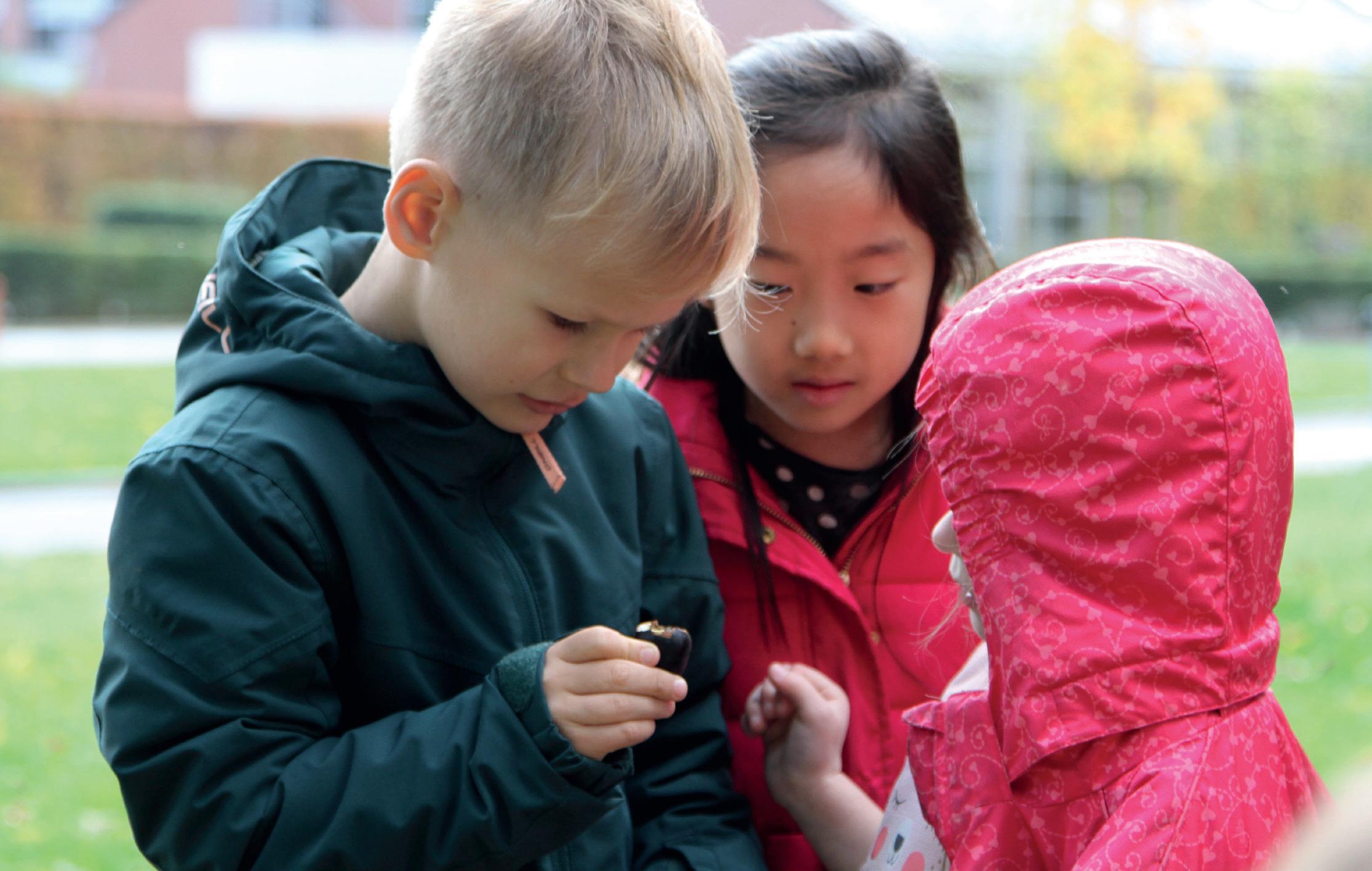
I wonder who I am and how I experience my world?
Our bodies and our senses, belonging, short timelines. Through the story of Beegu, we explore how other creatures and people might experience the world differently to us.
I wonder how we find our place in the wider world?
Mapping, continents, oceans and countries. Weather and climate. Through the story of Lost and Found, we explore the world, its climate zones, its oceans and continents and the concept of friendship.
I wonder what can we tell about time and place from the toys that children have had?
Materials, timelines, manufacturing processes. Through the story of Traction Man, we explore the idea of play, of toys and of how things have changed over time.
I wonder how we can help plants to thrive?
Biodiversity, plants and animals, growth, light and conservation. Can we encourage more pollinators into our school grounds, to do our bit for the environment?
Do some animals need more protection than others?
We explore our local environment and the animals who might need our help here in Belgium before looking out across the world at animals who are in decline. What can we do about this and how can we raise awareness so that the world takes action?
Can we protect our planet by being less wasteful?
We explore the idea of recycling and reusing our waste and visit a waste recycling centre to learn more about materials. Can we bring this learning back to school and explore how we manage our own waste both in school and at home?
What changes can we make to lead healthier and happier lives?
Food groups, balanced diets, exercise and mental health.
Have changes to technology been harmful or helpful?
How have objects changed over time as technology has developed and what has the effect been on how we lead our lives and affect the planet? Leading on to... How does scientific thinking change through our investigations?
Scientific inquiry into light and sound.
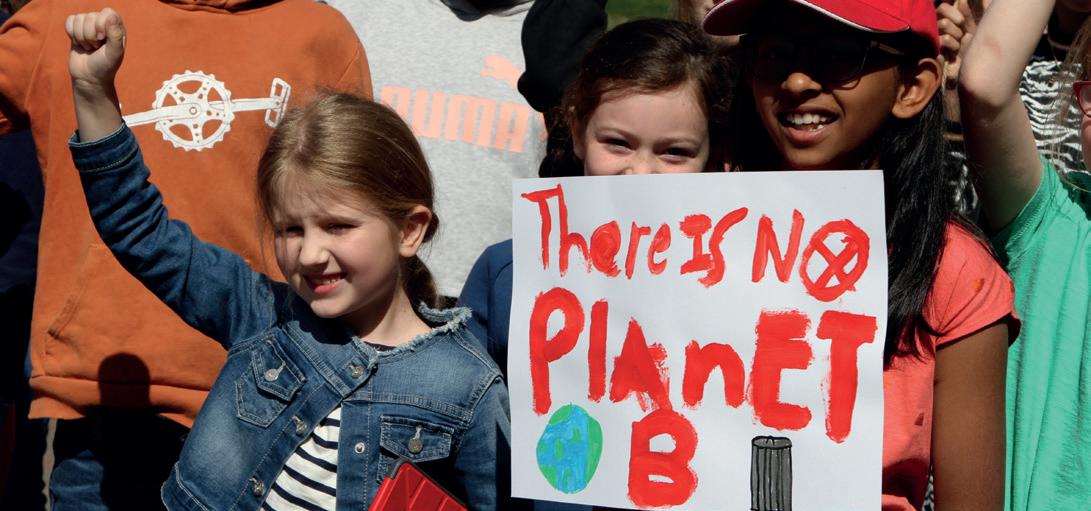
Who deserves to be remembered and why?
In this historical unit we look at some people from the past and consider whether they should be remembered. We learn about timelines and how historians use sources to learn about the past. We learn all about the nurse Edith Cavell and what she did that perhaps deserves to be remembered.
How has evolution changed our world?
Dinosaurs and fossils, extinction and adaptations – how can palaeontologists tell what came before us?
How does living in a volcanic region change the way people live?
A tour around the world to explore different volcanic regions of the world, learning about tectonic plate movements and the affect that volcanoes have on soil fertility.
Our Units of Discovery ask children to ask questions about the state of the worldpast, present and future.
How did creative Belgians shape the world?
An exploration of the impact that Belgian artists and architects have had on the physical world and (in Folon’s case), the social and human world through the declaration of human rights. We explore our own artistic selves both in our production and the creation of our own art work.
How have forces and extreme weather shaped the human world?
From earthquakes to hurricanes, what impact can earth have on humans and are humans making the earth more unstable?
An exploration of forces in science and how they work in the natural world.
How has history shaped the human world?
An exploration of the concept of civilisation and an exploration of a range of ancient civilisations from across the world.
Understanding how ancient civilisations lived alongside and interacted with each other and exploring why civilisations rise and fall.
How will we shape our future world?
Leading on from the previous unit, we explore how we might change our use of energy and commodities to create a more positive future for humankind.
How did early human beings move from surviving to thriving?
A look at the Stone Age and the achievements and developments of early human kind. How do anthropologists and archaeologists piece together this prehistory and help us to understand where we came from and how we developed?
Who does exploration benefit?
What did early explorers do to contribute to our understanding of our world and did they always behave with integrity? In this unit we ask whether the desire to explore is inherently human and what happens when our curiosity infringes on the rights of others.
How can scientists improve the world?
An exploration of scientific processes that help us to understand our world. Can science help us to solve some of the world’s problems? We will learn how to conduct fair and reliable experiments to explore a number of scientific ideas and concepts, thinking like a scientist as we go.
Do actions speak louder than words?
The history of protest and of human and civil rights. What types of protest are most effective and if we were to change the world, how might we go about it?
What is power?
In this unit the students explore the concept of power and begin by looking at power as a commodity linked to energy. They will make their own electrical circuits to help a refugee child in our story to find her way in the darkness.
Powerful Planets: Is the Earth unique?
An exploration of the power of the universe and the planets. From the big bang to gravity and the political powers behind space exploration.
What is political power and how does power create conflict and threaten peace?
Following the child we met in the first unit, we explore war and peace and how power can be abused to create conflicts. The children ask whether war can ever be justified and explore different examples.
Powerful Changes: Am I ready for transition and change?
As we prepare to leave Primary School behind and head to secondary, we explore the changes that are ahead both socially and physically and celebrate our learning journey so far.
Planning for our Units of Discovery is overseen by Curriculum leaders who ensure that all the objectives of the English National Curriculum are covered while allowing for creative cross-curricular learning.
Our teams then plan using the following pro-forma to ensure that each element of the curriculum is considered:
The Big Idea/Concept This is the overarching concept for the Year Group that connects learning across units.
Values (Guiding Statements) How the unit links to the learner profile.
Content (knowledge and understanding)
Outcome
Linked texts
Inspirational People / organisations / events
Creativity
Compassion / Action / Service
Coherence (links to other year groups)
What the children will learn (taken from the subject vertical progression documents).
The tangible goal for the unit; how the children will demonstrate their knowledge and understanding.
This can include texts that are being explored in the English Curriculum, from the library, guided reading or whole class reading texts.
Significant people, places, events, organisations that relate to the theme.
Examples of how the children will show their understanding in multiple ways e.g. innovation and experiential learning, play based learning, outdoor learning, drama, technology…
A key audience for the children’s work, how the children will ‘give back’ or initiate action or service to be a ‘force for good.’
Where the unit builds on previous learning or is leading to future learning.
Community Links to local expertise and resources; visitors who the children will meet along the way; local trips to places of interest.
EAL pre teaching opportunities Examples of activities, resources needed to be in place within the class and / or within specific EAL sessions.
Vocabulary
Assessment Opportunities
Outline of the Process
Key vocabulary that will be encountered / explicitly taught in the unit: this is divided into Tier 2 and Tier 3 vocabulary. (Tier 3 vocabulary is subject specific – for example ‘gravity’ whereas Tier 2 vocabulary is the kind of heightened vocabulary that children might encounter and struggle with in general knowledge/comprehension – for example ‘fragile’).
Examples of the specific learning that will be assessed and how – key assessment points in the process. This may differ to the ‘outcome’ as assessment happens all the time and is ongoing throughout Units of Discovery.
A brief outline of the teaching and learning process – step by step rather than lesson by lesson. The aim of this is to show the logical through line of learning and how it is sequenced.
While we believe that it is important for children to build strong and powerful relationships with class teachers, there are some subject areas where children benefit greatly from a specialist. At BSB we try to balance these needs by making sure that all our children have access to high quality subject specialist provision.
Most children at BSB will receive specialist French lessons. The exceptions are the bilingual classes where French is an inherent part of everyday lessons and EAL children who may need some extra support in learning English before beginning a third language.
Our Philosophy in French is simple: we believe in language acquisition through a playful and collaborative approach, rather than traditional grammar and vocabulary drills.
We embrace mixed-ability groups, fostering a supportive and inclusive environment where every child can thrive in their language learning journey.
In Early Years, children are gently introduced to the French language, seamlessly integrating French into their daily activities. This early exposure lays a solid foundation for language acquisition.
As students progress into KS1, they will enjoy four French lessons a week, designed around songs,
stories and games to ensure that language learning is not only educational but enjoyable.
In Years 3 and 4 the adventure continues, deepening language skills through hands-on activities such as role-play and musical exploration.
As the student matures in Year 5 and 6, the emphasis shifts slightly to enhance their understanding of language structure, ready for the demands of secondary school, but a focus remains on oral communication.
Students are active participants in their learning journey, creating dialogues, mini-plays and collaborative stories with peers. This approach fosters not only language skills, but also teamwork and creativity.
Outdoor learning is considered an entitlement for all children and there will be many opportunities for children to work outdoors with class teachers, but our Learning without Walls lessons are delivered by expert outdoor learning teachers.
They are timetabled to connect with Units of Discovery at different points in the year for different year groups and focus on building an appreciation of nature and the environment while developing a range of skills that support curriculum knowledge.
Your child might spend time building a shelter, thinking about the ingenuity of early human beings in adapting to changing circumstances and weather; they may find themselves creating beautiful artwork while at the same time connecting their learning to science and plants; they may find themselves building solar panels and investigating renewable energy to link to units of discovery on power.
Children who are in Upper Primary and not in EAL provision will also receive one Dutch lesson per week. Again, the purpose of the lessons is to equip students with the day-to-day skills they need to navigate living in a Dutch speaking region, while learning more about the culture and traditions of Belgium. Again, these lessons are designed to be playful, creative and interactive so that young people develop a sense of enjoyment in learning a language.
In Computer Science we aim to equip students with the knowledge, skills and aptitudes to help them to function in the digital age.
At primary level this consists of three main levels of engagement: coding, designing/ creating and end user software use.
We also work closely with PHSE to ensure that young people know how to use technology safely and responsibly. Each unit of work takes around six weeks to complete and where possible we connect to Units of Discovery to enhance the outcomes of their inquiries.
Whatever the learning, the children will be experiencing the benefits of being outdoors and connecting learning to the natural world.
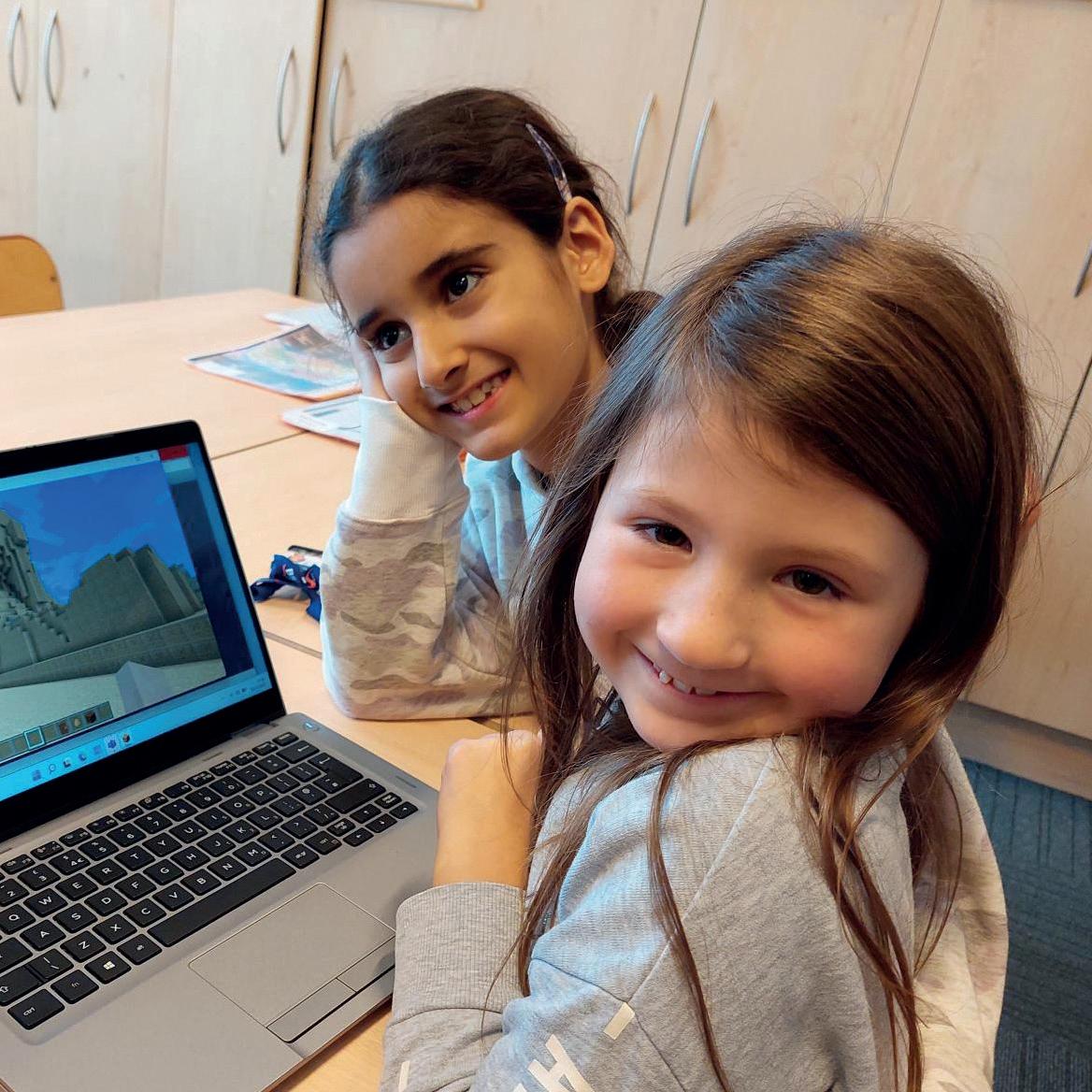
In the Early Years and Lower Primary school, the PE team at BSB work closely with class teachers to match their teaching with the developmental needs of the children.
This is particularly important for developing gross motor skills, upper body strength and balance for children. These skills have multiple benefits for children – for example, upper body strength is essential for developing the capacity to write.
Building on from developing physical skills and health, we introduce the children to specific sports and activities, such as swimming, that help them to begin to develop expertise and skill in a range of areas.
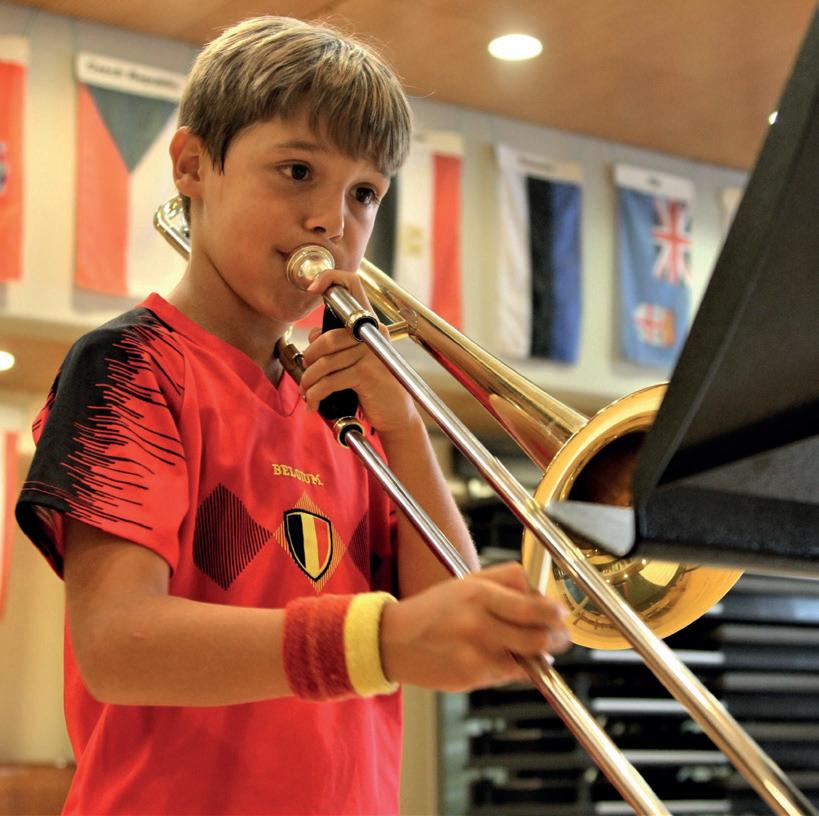
Music is an important part of life at BSB.
In addition to specialist music lessons, children will have singing assemblies and there are many opportunities for them to take part in extra-curricular activities. In their specialist music lessons, children will be introduced to the elements of music, can play with a range of instruments, including voice, and develop their improvisational and performance skills.